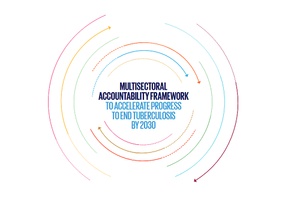WHO launches multisectoral accountability framework to end TB
WHO launches a multisectoral accountability framework to end TB as requested by the World Health Assembly and the UN General Assembly in 2018.
23 MAY 2019 | GENEVA – The World Health Organization (WHO) has released a multisectoral accountability framework to accelerate progress to end the TB epidemic. The framework was requested by the World Health Assembly and the UN General Assembly in 2018. WHO seeks to enable its adaptation and use by Member States and their partners at country, regional and global levels in 2019. The Framework was shared with Member States in advance of the 72nd World Health Assembly.
At the UN General Assembly high-level meeting on the fight
against TB in September 2018, Dr Tedros Adhanom Ghebreyesus, the
Director-General of WHO, stated, “We must hold each other
accountable for the promises we are making today. That’s
why we are developing a multisectoral accountability framework
with four components: commitment, action, monitoring and review,
to ensure we match our talk with real, lasting change.”
On the release of the multisectoral accountability framework, Dr
Tereza Kasaeva, Director of WHO’s Global TB Programme
noted, “We are at a turning point; we have even more
explicit commitments and targets towards ending TB, and we now
need action. WHO is already working closely with countries to
apply the framework so there is progress to report soon towards
2022 and 2030 targets.”
The framework (known for short as MAF-TB) aims
to support the process of defining who is accountable, what they
are accountable for, and how they will be held accountable, at
country and local levels, as well as at regional and global
levels. There are four components of the MAF-TB that form
a cycle for strengthening accountability: Commitments,
Actions, Monitoring and Reporting, and Review. The
MAF-TB provides guidance on defining elements under each of
these components, at national level as well as at global and
regional levels. Some highlighted accountability measures
are not yet established in many countries, and others need
urgent strengthening.
A first draft of the MAF-TB was developed, working with
stakeholders, following a request from leaders at the first WHO
Global Ministerial Conference on Ending TB in Moscow in November
2017, and at the WHO Executive Board in January 2018. At the
71st World Health Assembly (WHA) in May 2018, Member States
welcomed the WHO draft framework. The Political Declaration of
the UN General Assembly High-Level Meeting then called for the
Director-General of WHO to finalize the multisectoral
accountability framework and ensure its timely implementation in
2019. The WHO Secretariat finalized the framework,
following further consultation and contributions from Member
States and partners, including from civil society.
WHO will support Member States as they move to: assess the
baseline status of the components of the MAF-TB in their own
settings; involve officials and stakeholders in adapting the
framework; and monitor and review its use. WHO will
provide further operational guidance and tools. It will
collaborate with Member States and coordinate partners to enable
support to strengthen capacity and results at national, regional
and global levels. WHO will also lead coordination with UN
agencies and others on multisectoral collaboration linked with
the MAF-TB. Application and results in use of the MAF-TB will be
included in progress reporting on the TB response beginning from
2019.
The MAF-TB is available in English and will be available at
who.int/tb
shortly in the five other official UN languages.
Download the multisectoral accountability framework
Factsheet on the multisectoral accountability framework
Source:
WHO


